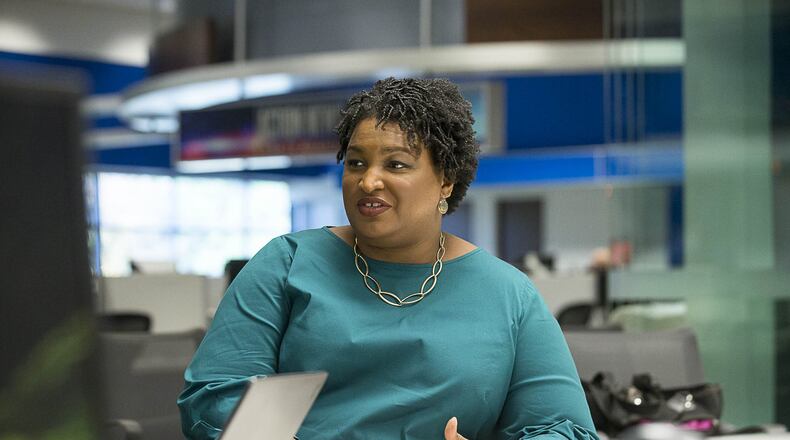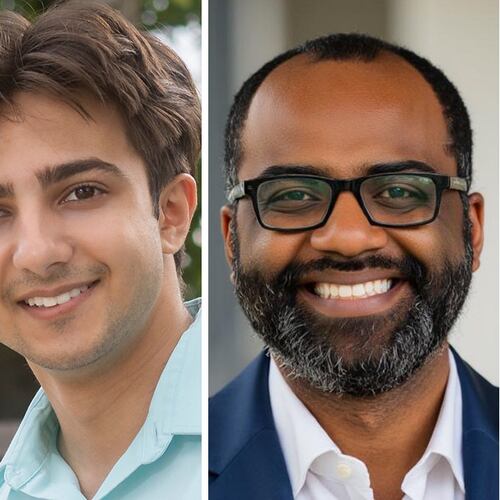Her campaign for governor may be over, but Stacey Abrams is not going away.
She told The Atlanta Journal-Constitution she's not ruling out a run for another public office, perhaps as early as 2020. But before she considers a new campaign, she is throwing her energy behind a new federal lawsuit alleging mismanagement and malfeasance at nearly every level of Georgia's electoral process.
“That does not happen in a functional democracy, and this cannot be repeated in any future election,” she said Saturday. “Georgia is too important of a state, and democracy is too core to who we are.”
A team of lawyers is gathering testimony from election workers, academics and statisticians as they prepare the lawsuit, said Lauren Groh-Wargo, Abrams’ gubernatorial campaign manager. The goal of the suit, which is still being finalized, will be to lay bare the state’s voter registration and elections system and dissect why and how the issues occurred.
“Literally just every day, this suit kind of grows and changes because the problems are so profound,” Groh-Wargo said.
Abrams said the lawsuit, which will fall under the umbrella of a new organization called Fair Fight Georgia, will look toward improving the state's election system prior to municipal elections in 2019 and the 2020 presidential election. Fair Fight may also push for legislative changes at the Capitol, and Abrams said it will hold the state accountable for running elections fairly.
“We have to consider all the pieces that go into voter suppression and diminishing the ability of voters to cast their ballots,” she said. “And that means looking at the staffing and sourcing of polling stations, making sure that there are an adequate number of machines, making certain that poll workers who are often volunteers aren’t judging whether or not someone gets to vote based on how many pieces of paper they have left.”
As for whether she will challenge U.S. Sen. David Perdue in 2020 or seek another bid for governor in four years, Abrams is mum. But she is confident her legal challenges will help continue to expand Georgia’s electorate.
“We know that over the next two years there will be new people who will find themselves energized by politics,” she said. “And I think what we can do in 2020 is absolutely complete the transformation that started this year. It won’t only be at the top of the ticket, but also down the ticket.”
She added: “I believe that Georgia is on the path to progress, and I intend to be a part of it.”
New approach
Long before Abrams was on the gubernatorial ballot, she told anyone who would listen that her party’s future in Georgia depended on rallying a new core of voters often neglected by candidates.
Her New Georgia Project voter registration effort aimed to mobilize the hundreds of thousands of left-leaning minority voters who often skip midterms. And her campaign launched with a focus on energizing liberals rather than aiming for moderates who vote for the GOP.
That she ended up winning both blocs of voters in her history-making quest to become the nation's first black female governor is an enduring irony of the race. That surge helped her earn more votes than any Democrat in Georgia history — but left her about 17,000 ballots short of forcing a runoff against Brian Kemp, who earned the most votes of any Georgia gubernatorial candidate ever.
“While we did not do as well in South Georgia as we hoped, we actually did not get blown out of the water,” Abrams said Saturday. “And I think that’s one of the reasons we had such a high-water mark in this election because we turned out voters across the state.”
Her strength at the top of the ticket helped further polarize Georgia's political map. She powered Democrats to a sweep of the metro Atlanta suburbs, carving a blue streak through areas Republicans have long dominated to help flip a U.S. House seat and win about a dozen down-ticket legislative races.
But she foundered in rural and exurban territories where Republicans reign, despite peppering her schedule with visits to GOP territory in places such as Whitfield and Cherokee counties. Kemp outdid even Donald Trump in some of those areas, helped by the president’s endorsement, while Abrams often fastidiously avoided talking about the commander in chief.
The focus on state-related issues was core to a strategy that helped turn out hundreds of thousands of new and irregular voters to the polls — a corps of Georgians she liked to call “unlikely voters.” It worked: More than 800,000 voters who skipped the 2014 midterm cast early ballots for this contest, including more than 260,000 minorities.
Now she is hoping to keep those same voters active and engaged even as she acknowledges their collective disappointment in the midterm results.
“That’s why I was so clear in my message that we can’t turn to apathy,” she said, adding: “Every time there have been questions or issues with the administration of elections, what happens is people get angry for a moment or they just turn off. That allows the system to continue to erode.”
Bowing out
Abrams said she decided not to make the usual concession speech because that would not have been consistent with her campaign mission to always tell the truth, no matter how uncomfortable. Her speech was full of critiques of Kemp's tenure as secretary of state and laid the groundwork for the lawsuit she announced the following day.
“If you know something is wrong, you cannot be silent, whether it’s wrong that you’ve done or wrong that someone else has done.” she said. “And my responsibility was to call out that wrong.”
Fair Fight Georgia, the lawsuit and anything else she does from here will be about trying find the root causes of those wrongs and fix them, Abrams said. U.S. Rep. Hank Johnson, D-Lithonia, said he looks forward to seeing what she is able to produce.
“Our voting process is archaic and subject to corruption in this process, and it’s unreliable and untrustworthy,” he said. “I think Stacey is going to dedicate herself to ensuring that changes are made and that we will have a voting system in Georgia that we will all be proud of.”
She is not ready to say whether she will run for public office again. But she believes Georgia is a battleground state that will continue to draw national attention, and she wants to be more than a case study or cautionary tale.
“It is insufficient to say there is a problem and then exonerate yourself from having to do anything about it because you didn’t get the result you wanted,” she said. “My job since my parents raised me has been to see a problem, find a solution and then be responsible for the execution of that solution. And that is what I’ going to do.”
Keep Reading
The Latest
Featured






